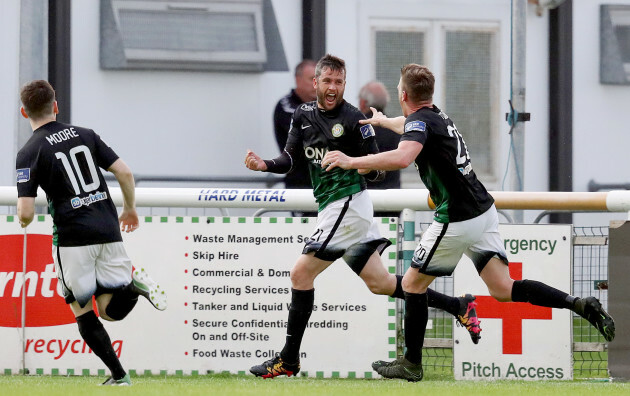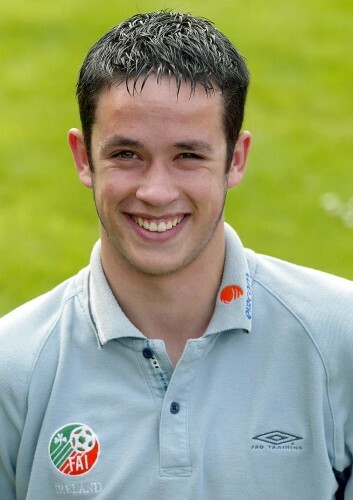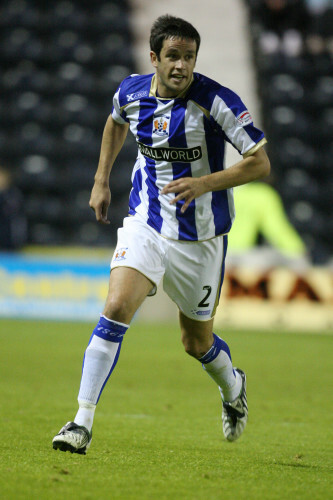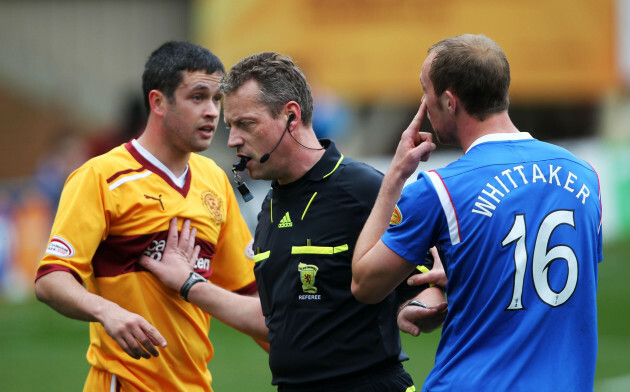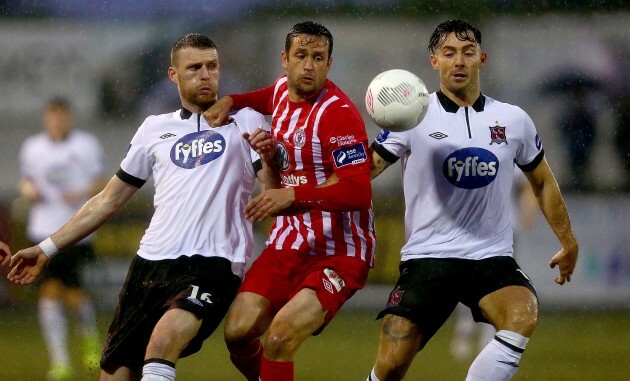AT 33 YEARS of age, Tim Clancy is in the goalscoring form of his career right now.
By netting the winner in last Friday’s 3-2 win over Derry City, the Bray Wanderers defender took his tally to three goals in 17 Premier Division appearances this season.
Granted, that modest return is dwarfed by that of Seagulls team-mate Gary McCabe (13) and Preston North End-bound Sean Maguire (18), but it’s an impressive figure when you consider Clancy had managed to score just three times in senior football prior to the current campaign.
“I don’t get too many goals,” Clancy tells The42. “I’ve got three this season, which is a lot more than I’ve had in a long time. It’s good to chip in with the odd goal every now and again.
“The problem we have at Bray is keeping them out at the other end. That’s my main job and we have to tighten up.
“But we’re value for money as there are plenty of goals in our games and you won’t go home bored after watching us play!”
He makes a good point. Under Harry Kenny, the Seagulls have recruited well and turned their fortunes around to become a serious outfit.
Only runaway leaders Cork City (52) have found the net more times than the Seagulls (38), but they have also conceded 33 times — putting them alongside Finn Harps as the club with the joint-second-worst defence in the Premier Division.
Drogheda United, on 34, sit top of that unwanted table.
“We play quite an offensive style with the likes of Gary McCabe, Aaron Greene and Dylan Connolly all very attacking players,” Clancy says. “Maybe that leaves us a bit open at the back.
It’s definitely something we have to do better with as there are far too many goals going in every week. We can’t keep relying on scoring three or four goals in every game.
“Harry has been working on it all season and we’ve had a number of different combinations at the back. There have been a lot of changes, although some of them have been enforced with injuries and suspensions.
“We’re not doing anything differently to last season, it just happens to be that we’re conceding a lot of goals, which is a concern. But the main thing is we’re still winning games and we’re up the right end of the table.”
Before the Derry result, Bray had gone five league matches without victory so it was an important three points straight after the mid-season break to leave them third with Shamrock Rovers and the Candystripes both hot on their heels.
“This time last year we were sitting bottom of the league,” he says. “There has been a huge upturn in fortunes since Harry and Liam [O'Brien] took over. They have had unbelievable results.
“I know we’re sitting there now and competing, but when you look at the teams that are behind us, Derry and Shamrock Rovers are both full-time.
“We’re still only part-time so it’s not like we’re expected to finish third but if we keep getting results we’ll get our confidence back and re-evaluate around September time.”
There’s a perception out there that Bray have spent big to build this team and while the top names are likely to be on decent contracts, Clancy insists that most of the squad balance their football commitments with other jobs.
“We’ve signed a few players and I’m sure they got good deals but the vast majority of us wouldn’t be on great money, which is probably the reason that a lot of lads work as well.”
And while the defender isn’t currently in employment, he has been planning for the future by doing his Uefa A Licence badges and taking a sports therapy course.
I wasted 10 years of my career when I was in the UK not upskilling!” he accepts. “I should have had my coaching badges long ago and I was offered to do them for free but I said ‘sure I’ll do them next year’.
“Then next year became a few years and here I am chasing my tail. You never think you’re going to get old, do you?!
“Listen, I’ve nearly got the A Licence now, I get the results next week and I’d imagine I passed it. My priority will be to stay in football. I want to go into management so I’ll try get into the Pro Licence as soon as I can.
“I’m looking at the sports therapy as a back-up to a career in football.”
Now in the veteran stages of his career, Clancy very nearly wasted a golden opportunity to become a professional footballer the first time around.
Growing up in Trim, County Meath, he signed for local club Trim Celtic at the age of six. At U13, his team progressed to the quarter-finals of the All-Ireland, where they travelled to Fairview Park in Dublin to take on Belvedere.
Trim lost 1-0 but, after catching the eye, Clancy was asked to sign for Belvo by the opposing manager. He politely declined but changed his mind when the offer was again made after a friendly match between the clubs that summer.
The move to the DDSL club saw him develop and attract attention from England.
“Millwall and Belvedere had a link at that time,” he explains. “A couple of Irish players had gone over — Richard Sadlier, Robbie Ryan and Mark Kennedy years ago. Mark Quigley joined the year before me.
“They came over to watch one of my games and luckily enough I got picked out. I was offered a contract and signed just after my 18th birthday.”
Adjusting to life was tough, however, and Clancy admits that his commitment levels at that age left a lot to be desired.
“I came from a small town in Meath and went from there to the edge of London, which is a massive city,” he tells. “No one really looks after you. You’re in a 9.30am in the morning and train until 1.30pm, but they don’t care what you do then once you’re in the next morning.
“At the time, there were about 11 or 12 Irish at the club and eight or nine of us lived in digs together so naturally when you get bored with nothing to do in the evenings you got up to stuff you shouldn’t be.
“We were all young and looking back now, if I could go back and change it I’d probably have been a lot more professional. I’d put a lot more emphasis work-rate and self-improvement than I did, to be honest.
“You’d see other guys that had a great attitude and when you were young it was like ‘look at that lick arse being busy doing his extra work’. You get to an age and realise he’s doing it for his own benefit.
You look at the careers some of the lads have had and think ‘that could have been me’.”
After failing to make the grade at Millwall, Clancy had to drop down to non-league Fisher Athletic to learn his trade but swore to his wife, at that time his girlfriend, that if he got a second chance at a big club things would be different.
That period taught him about the importance of leaving everything out on the pitch at 3pm on a Saturday and Clancy had to mature quickly in what was a physical environment.
In 2007, Kilmarnock showed interest and he agreed a move to Scotland. Clancy later learned that the Fisher chairman had hid several offers from other clubs — including his former employers — from him.
“I found out after I had left that a number of clubs had come in to inquire about me but the chairman never told me,” he says. “Millwall tried to sign me again but I was never told. I wasn’t on a contract, it was a game-to-game basis so I could have jumped ship straight away.”
Clancy had four-and-a-half years at Killie and conducted himself in a much more professional manner.
“I was a first team player, whereas at Millwall I was a youth player,” he says. “This time, I took pride in how hard I trained and did the best I could, thinking the rest would look after itself.”
Current Derry City boss Kenny Shiels then came in and brought his own players along, meaning Clancy was forced out of the team. He asked to leave and joined Motherwell in 2011 — making 30 appearances in one season there.
On the back of that, Hibernian manager Pat Fenlon signed him.
“I had a good relationship with Pat,” he says. “If you step out of line, he will let you know. You would have words and it would be forgotten about. There are no grudges at all.
“I’ve had a few falling-outs with managers in the past and you feel it’s always there in the background but that’s not the case with Pat.”
Injuries had hampered Clancy throughout his career and he attempted to play through the pain caused by osteitis pubis.
“I had a problem with my groin and my stomach and there was inflammation on my pubic bone. I struggled for the 18 months I was there. Pat was great but I was injured for a lot of the time.
“I was feeling it in pre-season and battled through to play the first 12 games. The last month, I was just training on a Friday after doing work with physio all week. Even with that, I was stiffening up at half-time so I’d go on the bike during the interval to prevent that!
“It got to a point where I couldn’t get out of bed. The physio tried to get me to rest for six to eight weeks, then I had an operation to give me more space around the pubic bone. I came back and we had a good spell — beating Celtic — and then I played in the Edinburgh derby in the New Year.
“I had three games in a week after missing 10 weeks. The end of that season it kicked in again and I ended up missing the Scottish Cup final against Celtic due to the injury.”
And bad luck in finals was a recurring theme.
“I joined Kilmarnock just after they got beaten in the League Cup final against Hibs,” he remembers. “When I left Kilmarnock, they won the Scottish Cup or the League Cup six months later.
“I signed Motherwell a month after they got beaten in the Scottish Cup final against Celtic, and then I joined Hibs a month after they got beaten in the Scottish Cup final by Hearts.
“Then at Hibs, I missed the final through injury. During my time with St Johnstone, I snapped my Achilles two days before the Scottish Cup final.
So I don’t have too much luck in regards to cup finals. If I get to one this year, I think I’ll sit out the last few weeks of training!”
Having moved to St Johnstone in 2014, he scored the second of just two goals during his time in Scotland. Funnily enough, both were against Celtic.
“I’m a big Celtic fan and so is the wife, she’s from Belfast,” he says.
“I used to get tortured every time I played against them and the phone would be pinging with all sorts of abuse.
“It was a good experience. You’re playing in front of 40,000-50,000 and that’s the major benefit of playing in Scotland. It’s a decent standard but you have a few big clubs up there.
“My second start for Kilmarnock was away to Rangers at Ibrox just before Christmas. It was a rainy day and I just remember walking down the tunnel and the noise coming from the stadium.
“I thought to myself ‘this is what it’s all about’. Imagine playing in front of that every week.
I was lucky enough to play for Hibs in the Edinburgh derby and that’s some atmosphere. It was an enjoyable time, but it can’t last forever.”
Clancy, his wife and their first child had moved home to Trim after leaving Hibs before he went back over for the short spell at St Johnstone.
After snapping his Achilles, however, he returned to Ireland and sought treatment from Shamrock Rovers physio Tony McCarthy. Hoops boss Fenlon offered his former player the chance to do pre-season with the club and he joined them briefly.
There was also a stint at Sligo Rovers but the struggles with fitness continued.
“When I played professionally over in Scotland I was probably 10 kilos lighter than I am now,” he says. “Realistically, I know I’m not going to be able to do that.
“When I started pre-season with Sligo, I trained everyday and got myself down to seven or eight kilos and my osteitis pubis came back straight away. So I missed eight weeks of the season because of that.
“For me to get myself to that level of fitness I’ll probably break down because I’ve had a lot of injuries over the years. I’ve to try maintain myself the best I can and get a little bit fitter but not to the detriment of me.”
This season, he has made 17 league appearances out of a possible 19 for Bray and, touch wood, the injuries have stayed away.
“I’m feeling alright, not too bad. The older you get, the harder it is to get yourself fit. I’m happy enough with how it’s going. Hopefully we can hang on around the European spots.”
The42 is on Instagram! Tap the button below on your phone to follow us!

